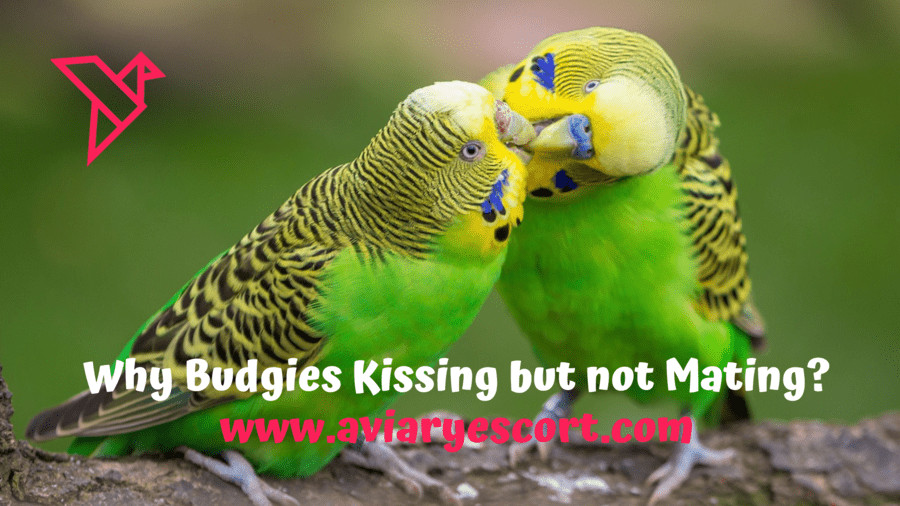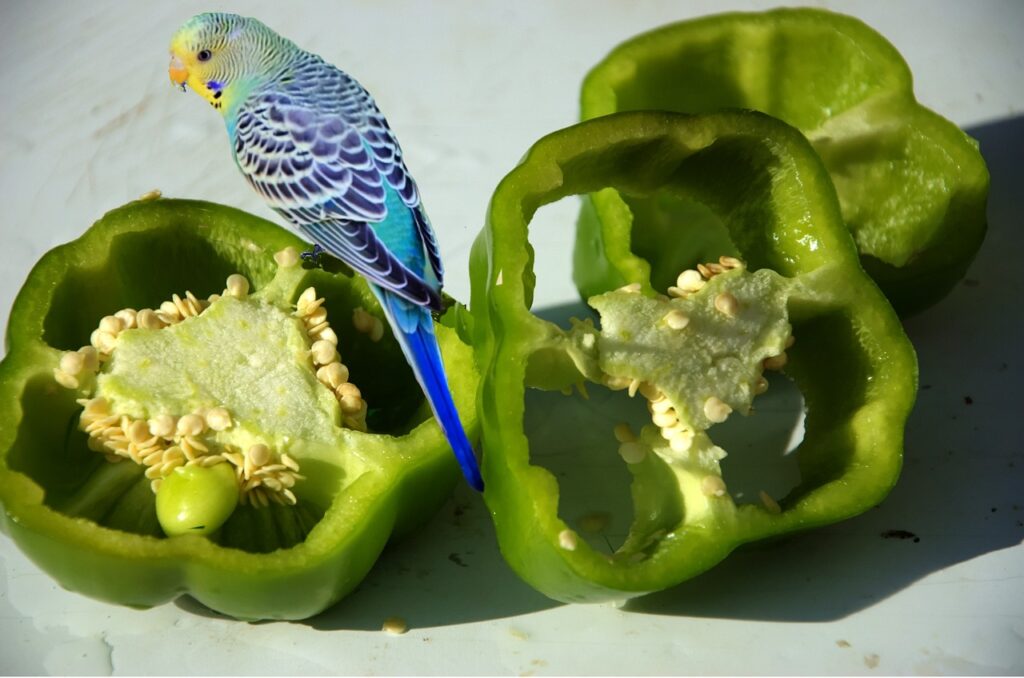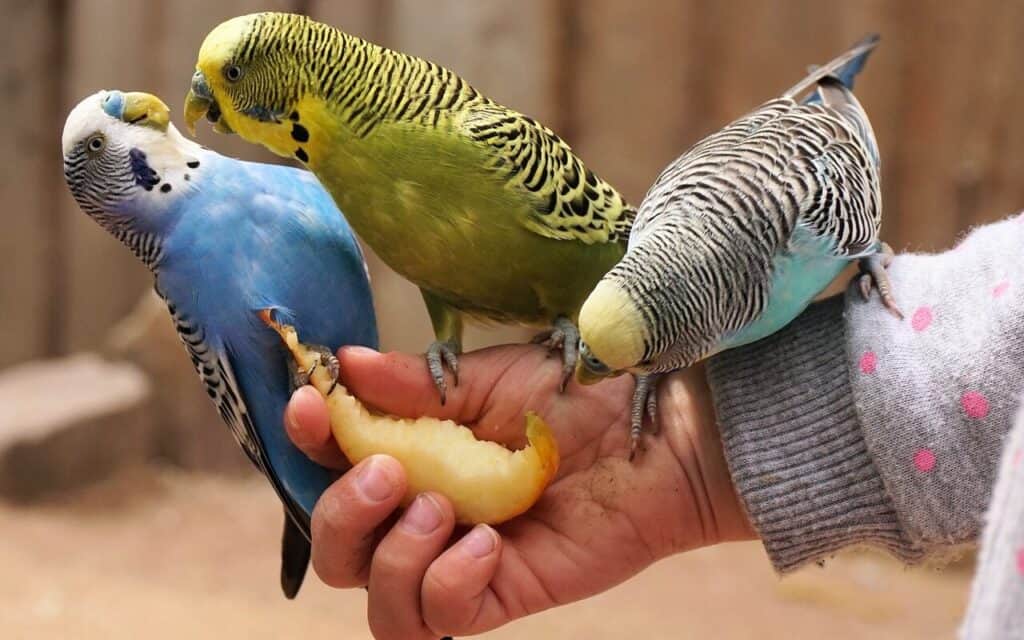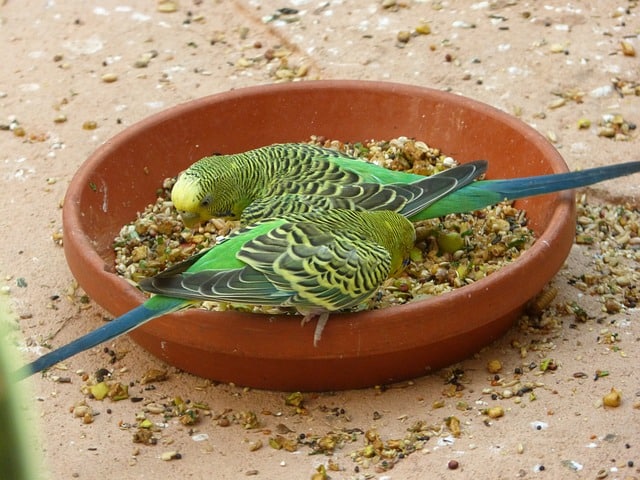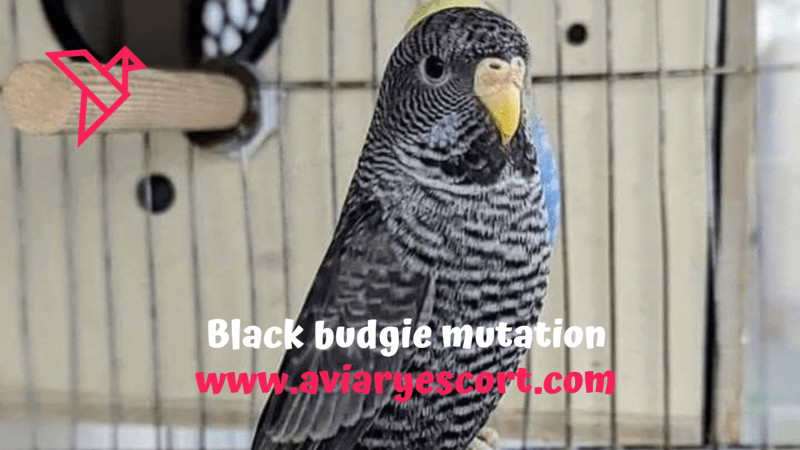Budgies, also known as parakeets, are delightful and social birds that exhibit a range of behaviors, often leaving owners curious about their interactions. One common behavior that perplexes many budgie owners is witnessing their feathered companions kissing without progressing to mating. In this comprehensive guide, we delve into the intriguing world of budgie behavior, exploring the reasons behind this phenomenon and shedding light on the dynamics of their interactions.
Why Do Budgies Kiss?
Budgies, or parakeets, showcase a unique behavior known as “kissing,” which involves the touching of beaks. This action, often observed among these social birds, carries significance in their communication and social interactions.
Affection and Social Bonding
Kissing among budgies primarily signifies affection and social bonding. It’s akin to humans expressing closeness through gestures like hugging or handshakes. These small, colorful birds are highly social creatures, and beak touching is their way of establishing and maintaining social connections within their flock or with their human companions.
Communication and Trust Building
Beyond mere physical contact, kissing serves as a means of communication for budgies. Through this action, they convey trust and camaraderie. It’s a display of comfort and reliance on their fellow budgies or their human caregivers. This behavior strengthens their bond and contributes to a harmonious social environment.
Differentiating Kissing from Mating Behavior
Budgies exhibit a range of behaviors, and it’s crucial to differentiate between their affectionate gestures, like kissing, and behaviors associated with mating, as they serve distinct purposes within their social interactions.
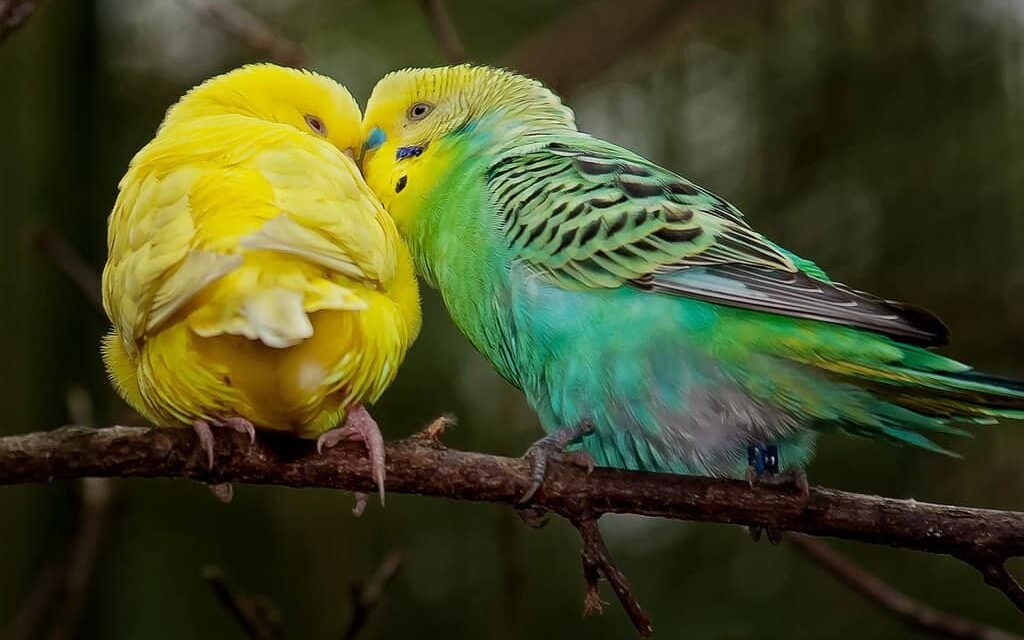
Kissing Behavior:
Kissing, or beak touching, among budgies is an expression of trust, affection, and camaraderie. It involves gently touching beaks, often accompanied by soft vocalizations or preening gestures. This behavior is primarily non-sexual and serves as a means of bonding within the flock or between bonded pairs and their human companions.
Characteristics of Kissing:
- Gentle beak touching, often reciprocated between budgies.
- Occurs in various social contexts, emphasizing trust and closeness.
- Accompanied by soft vocalizations or grooming behaviors.
Mating Behavior:
Mating behavior in budgies involves specific rituals associated with courtship, reproduction, and nest-building. This behavior is driven by the instinct to reproduce and create offspring. Budgies engaging in mating behavior exhibit distinct actions tailored towards breeding, different from the non-reproductive gestures of kissing.
Characteristics of Mating:
- Courtship rituals like displaying plumage, singing, or dancing to attract a mate.
- Feeding behaviors between potential mates.
- Nest-building activities, such as gathering nesting materials.
Key Differences:
- Intent and Purpose:
- Kissing focuses on bonding and trust-building without a reproductive motive, while mating behavior is geared towards reproduction and perpetuating the species.
- Physical Gestures:
- Kissing involves gentle beak touching and mutual interaction, whereas mating behaviors include specific rituals aimed at attracting a mate and engaging in reproductive activities.
- Context and Occurrence:
- Kissing occurs in various social settings, emphasizing companionship and closeness, while mating behaviors are primarily observed during the breeding season or when budgies are ready to reproduce.
- Vocalizations and Body Language:
- Kissing may involve soft vocalizations and reciprocal gestures, while mating behaviors often include distinct vocalizations and displays to attract potential mates.
Why Budgies Engage in Kissing Without Mating?
Observing budgies kissing without progressing to mating might leave owners curious about the reasons behind this behavior. Several factors contribute to budgies displaying affectionate gestures without transitioning to mating behaviors.
1. Lack of Privacy
Budgies, being sensitive creatures, require a certain level of privacy for mating. If their living space lacks seclusion or if there’s consistent disturbance, they might refrain from mating despite displaying affectionate behavior. Budgies prefer a quiet and secluded area for mating. Ensure their cage or nesting area is placed away from loud noises, frequent foot traffic, or sudden disruptions.
Providing a cozy nesting box or secluded corner within the cage can encourage them to express their natural mating instincts.
2. Probability of Same Gender
Owners might observe kissing behaviors between same-gender pairs. While these displays are affectionate and signify strong bonds, they don’t lead to mating as budgies are monomorphic, making it challenging to determine gender solely based on appearance. It’s important to note that same-gender pairs won’t engage in reproductive behaviors.
You might differentiate between the male and female budgies on the base of cere color, with male having bluish cere and female with brown. But remember their are some mutations in which this rule has limitations. Seek professional vet help or use DNA testing to make sure you have the right pair.
3. Not Ready to Breed
The maturity level of budgies plays a pivotal role in their mating behavior. Young or immature budgies might exhibit affectionate behaviors like kissing without proceeding to mate due to their immaturity.
Budgies typically reach sexual maturity between 6 to 12 months of age, but this can vary among individuals.
Read more! How Old Do Budgies Have to Be to Breed?
4.Unconvincing Nesting Areas
Budgies might kiss without mating if their environment lacks adequate nesting spaces. Budgies require a cozy and secure nesting box or area within their habitat to feel comfortable enough for mating. Lack of suitable nesting space can deter them from expressing their natural mating instincts.
Ensure your budgies have a nesting box that is appropriately sized, secure, and placed in a quiet area of their cage. Having ample space within the enclosure allows them to move freely and fosters a conducive environment for mating behavior.
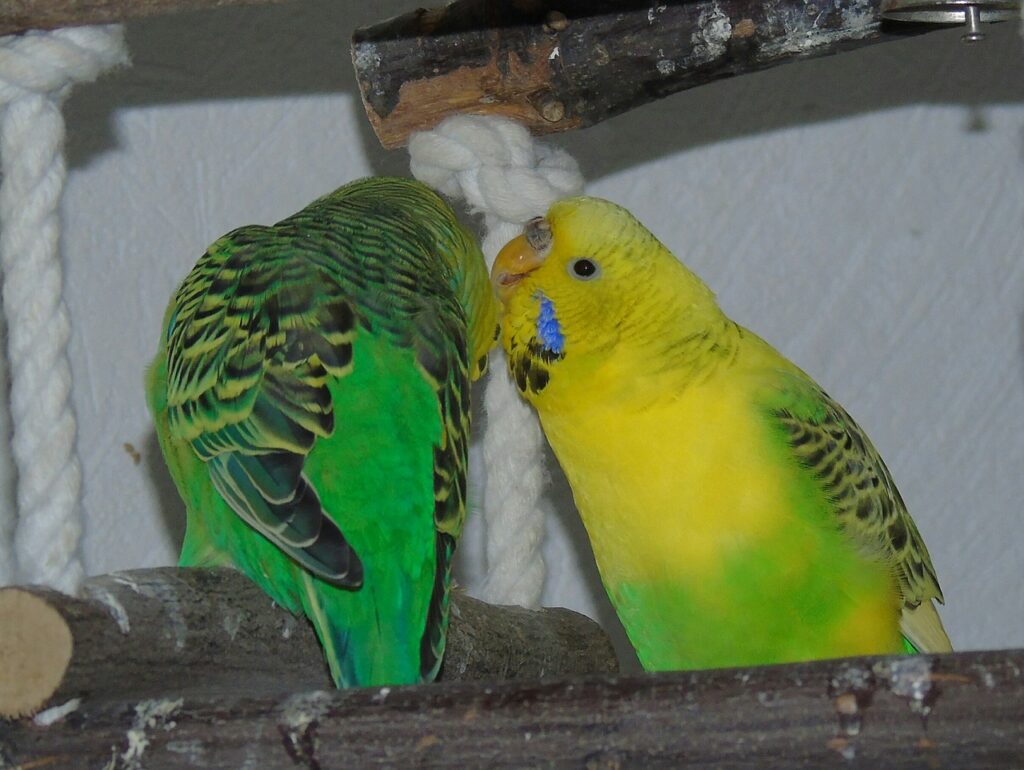
5. Cage Size and Setup
Inadequate cage space or improper layout can affect their comfort and readiness to mate. Budgies may engage in kissing but not mating due to a lack of sufficient space or a nesting area conducive to their breeding instincts.
Read our article Budgie Cage Setup Ideas: 30 Expert Tips
6. Health Concerns
Budgies experiencing health issues such as hormonal imbalances or reproductive complications might exhibit kissing behaviors without progressing to mating. Underlying health issues can hinder their ability or inclination to proceed towards reproduction.
7. Depressed Budgie
Similar to humans, budgies can experience emotions like depression, which can significantly affect their behaviors, including mating. A depressed budgie may exhibit disinterest in mating despite showing affectionate behaviors.
Indications of depression in budgies include lethargy, decreased appetite, excessive sleeping, withdrawal from social interactions, and a lack of interest in typical activities, including mating behaviors.
8. Budgies in Less Numbers
In some cases, having only one pair or a limited number of budgies might affect breeding behaviors. Budgies prefer larger flocks, and if they perceive a small group, they might not feel the social support needed to engage in mating behaviors. A larger flock might encourage a more natural breeding environment.
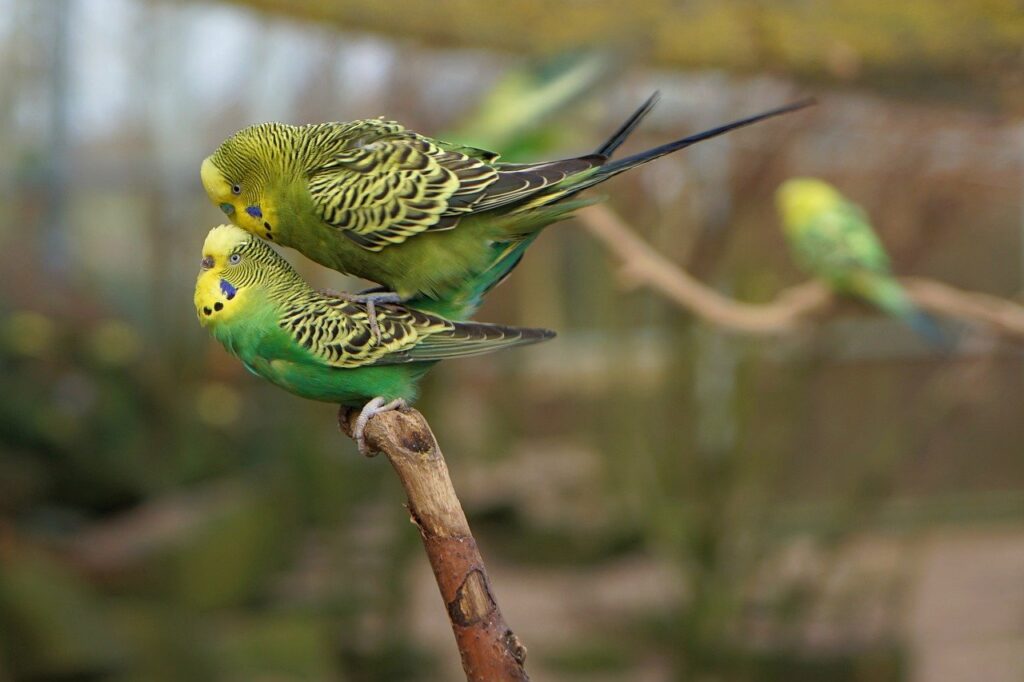
Read more! How Many Budgies Should I Get? | Complete Guide
Patience is Key: Allow Time for Budgie Mating
As a budgie owner, it’s natural to anticipate mating behaviors once you observe your birds engaging in affectionate behaviors like kissing. However, it’s essential to exercise patience and understand that the progression from kissing to mating requires time and various factors to align harmoniously.
Transitioning from kissing to mating isn’t an immediate process. Budgies, like many birds, have their own timelines and readiness factors when it comes to reproduction. Expecting immediate mating behaviors after observing kissing might lead to frustration.
Conclusion
In summary, budgies engage in kissing as a way to express affection, build social bonds, and communicate trust within their flock or with their human companions. This behavior serves as a vital component of their social interactions, distinct from the specific rituals associated with mating behavior.
Understanding the nuances behind budgie behavior, including their propensity to kiss without mating, provides valuable insights into their social dynamics and enriches the experience of caring for these delightful avian companions.
FAQs
1. Why do budgies kiss each other?
Budgies kiss to display affection and strengthen their bond, much like humans express closeness through gestures.
2. Are kissing budgies always a mating sign?
No, kissing behaviors in budgies can signify affection and bonding rather than strictly mating intentions.
3. How long does it take for budgies to mate after kissing behavior?
The timeline can vary based on individual budgies and their comfort levels. It might take weeks or even months before they progress to mating.
4. Can environmental factors affect budgie mating?
Yes, a secure and comfortable environment is essential for budgies to feel safe enough to mate. Stress or insecurity can hinder their mating instincts.
5. Should I be concerned if my budgies don’t mate despite kissing?
Not necessarily. Allow them time to establish trust and comfort. If they seem healthy and happy, it might just be a matter of time.
Read more! How to Breed Budgies Fast at Home
